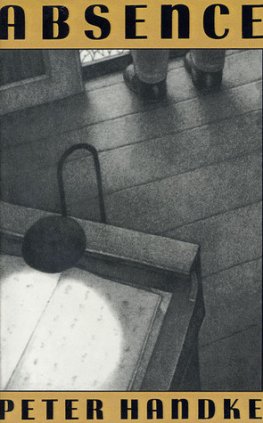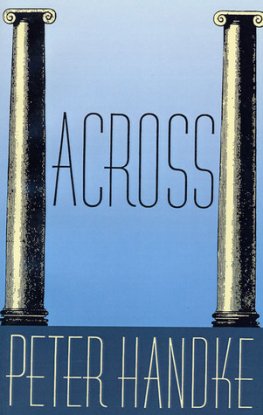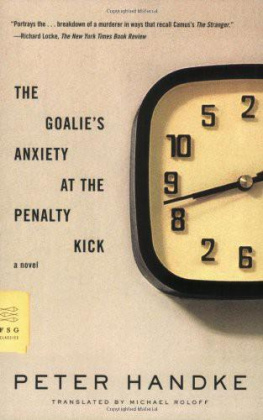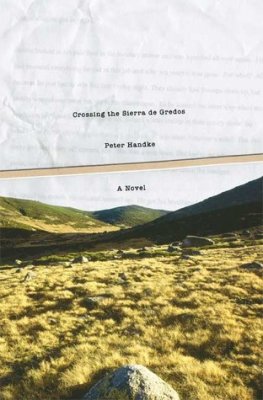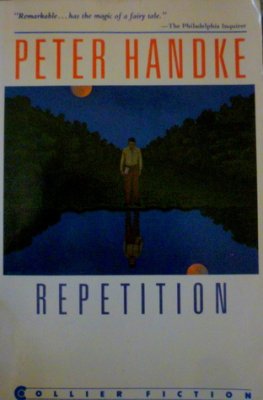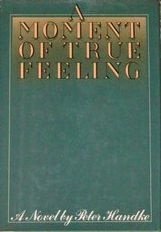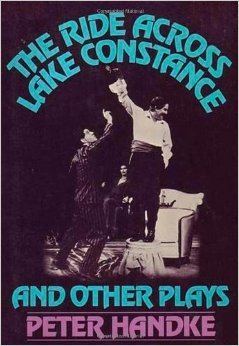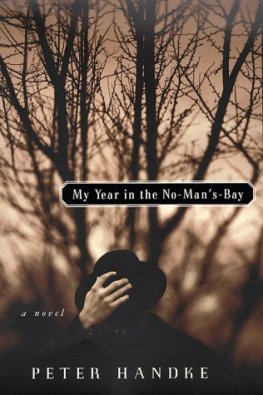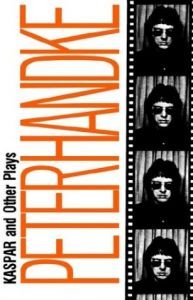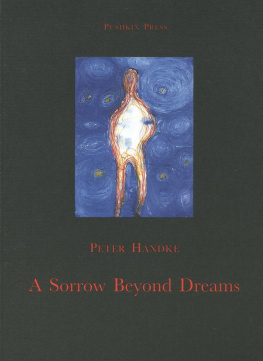Peter Handke - Absence
Here you can read online Peter Handke - Absence full text of the book (entire story) in english for free. Download pdf and epub, get meaning, cover and reviews about this ebook. year: 2000, publisher: Farrar, Straus and Giroux, genre: Prose. Description of the work, (preface) as well as reviews are available. Best literature library LitArk.com created for fans of good reading and offers a wide selection of genres:
Romance novel
Science fiction
Adventure
Detective
Science
History
Home and family
Prose
Art
Politics
Computer
Non-fiction
Religion
Business
Children
Humor
Choose a favorite category and find really read worthwhile books. Enjoy immersion in the world of imagination, feel the emotions of the characters or learn something new for yourself, make an fascinating discovery.
- Book:Absence
- Author:
- Publisher:Farrar, Straus and Giroux
- Genre:
- Year:2000
- Rating:5 / 5
- Favourites:Add to favourites
- Your mark:
- 100
- 1
- 2
- 3
- 4
- 5
Absence: summary, description and annotation
We offer to read an annotation, description, summary or preface (depends on what the author of the book "Absence" wrote himself). If you haven't found the necessary information about the book — write in the comments, we will try to find it.
Absence — read online for free the complete book (whole text) full work
Below is the text of the book, divided by pages. System saving the place of the last page read, allows you to conveniently read the book "Absence" online for free, without having to search again every time where you left off. Put a bookmark, and you can go to the page where you finished reading at any time.
Font size:
Interval:
Bookmark:
Peter Handke
Absence
A horse of the kingdom-his qualities are complete. Now he looks anxious, now to be losing the way, now to be forgetting himself. Such a horse prances along, or pushes on, spurning the dust and now knowing where he is.
CHUANG TZUMans life between heaven and earth is like a white colt dropping into a crevasse and suddenly disappearing Suppose we try to roam about in the palace of Nowhere, where all things are one.
CHUANG TZULate one Sunday afternoon the statues on the city squares are casting long shadows and the humped asphalt of the deserted suburban streets is giving off a bronze glow. The only sounds from inside the caf are the hum of the ventilator and an intermittent clatter. A glance goes up to the branches of a plane tree, as if someone were standing under it, watching the countless incessantly swinging seedpods, the large-lobed, long-stemmed leaves, which move spasmodically, all together, like a semaphore, and the swaying, deep-yellow nests of sunlight in the foliage; where the blotchy trunk forks there is a hollow that might be the home of some animal. Another glance goes down to a fast-flowing river, which, as seen from the bank, the sun shines through to the bottom, revealing a long fish, light-gray like the pebbles rolling in the current below it. At the same time, the rays of the sun reach the wall of a basement room, filling the entire pictureless surface and giving the whitewash a grainy look. The room is neither abandoned nor uninhabited; it is populated, always at eye level, by the silhouettes of flying birds and, at intervals, of passersby on the road, for the most part bicyclists. Likewise, at eye level, a lone Far Eastern mountain appears on the horizon, lit by the last rays of the sun. The picture comes closer, bringing into prominence at its rounded upper edge the precipitous summit which, with its crags and chimneys, ledges and glassy walls, suggests an impregnable and inaccessible castle. The sun has set; here and there a light in a house; on the blank wall of the basement room the reflection of the yellow sky is traversed by patterns that have now lost their outlines. The wall is now so totally blank that the deep-red number on a small tear-off calendar moves into the picture.
In a park there is a castle-like nineteenth-century building with tall windows surmounted by triangular tympana and just under the eaves some hundred attic windows running all around the building. The immensity of this edifice makes the park seem small; vegetation, walks, and benches are unimpressive; only an aborted avenue of birches and the solitary plane tree with its pillar-like branches, which seems to grow out of an enormous bench, give an intimation of a past epoch. Because it is Sunday afternoon, the expressways on either side of the apparent castle are not being used by trucks but only by private cars. Unlike the few houses scattered roundabout, which in the presence of the huge building look like little more than huts, the castle shows light in almost all its windows, as though some great festivity were in progress from floor to floor and, through the open double doors, from hall to hall. But the building is an old peoples home or, as the sign at the entrance indicates, a SANATORIUM FOR THE ELDERLY, and the bright serried window squares signify separate rooms. In some of them, behind often curtainless panes, the silhouettes of the occupants, always immobile, inactive, and for the most part unseeing. Other windows are open, making the rooms look deserted in spite of the burning ceiling lights, the potted plants, and the birdcages. Even the lights from the television sets leap across empty walls and change color for no one but themselves. The clicking of an electric iron and the clatter when it is set down come from a room occupied by one of the staff. The head in the attic window, with the all-seeing eyes of a detective or a scientist, is that of a young man, not an inmate of the home. The only laughter in the festively illumined transept is that of the audience on the television screen, which erupts at regular intervals, as though on command. The only natural singing comes from a kitchen maid who is lifting the lid from an enormous tin pot in the white-tiled basement; actually, it is more like short snatches of monotone humming, with which she is merely testing her voice. The gravel path to the entrance ends at a low step, an impediment large enough that it has to be flanked on either side by a railing, whose brass supports, along with the elbow crutches of the one elderly person still to be seen there, are the only glittering spots under the yellow sky.
At the back of one of the few apparently unlit rooms, a lamp is burning after all; it is mounted on a lectern. In the surrounding half darkness, this lamp, tiny as it is, casts a bright circle of light on the lectern, on which lies an open notebook, with outsized hard covers, wrapped in cracked, many-times-mended canvas, its paper spotted with mold, as though the whole had a story of its own, as though it had often been exposed to sun and rain, or had even been part of someones luggage on the high seas. The pages are covered with columns of signs that vaguely suggest hieroglyphics. Beside them, written in a clear, official-looking, yet childlike hand, are words that seem to be attempts (some followed by question marks) to decipher the signs, such as to bear in mind; to master; to break camp; to set out; to sit down?; the runnel?; the cliff on the border?; the watershed? In the space under the spine of the notebook: a black hexagonal pencil. The near-emptiness of the room, with its long, broad floorboards, whose converging lines, marked by spiral knotholes and polished nail-heads, tend toward a single point in the distance, makes it seem spacious, while the oval ornaments of its stucco ceiling give it an air of nobility. The lectern stands on a raised platform, suggesting the balcony in the study of a medieval scholar. The only other furniture is a folding bed in a wall niche, stored there, one supposes, in anticipation of some expedition; in lieu of a blanket a sleeping bag is draped over the naked frame. The slight rounding at the top of the window makes it look like an arcade. On the floor below it two dumbbells, their paint flaking, and an empty, shapeless, and shrunken knapsack.
The occupant, who is standing at the window, is not an inmate of the home; he is the master of this room. True, he is holding a stick, but it is not a crutch it is a walking stick, made of hard, rigid, almost unbreakable rosewood; with the few large, sharp-beaked thorns that are still on it, it might also serve as a weapon its owner, an old man, holds it in his fist like a scepter. Though everything else in the mans face, the skin, the lips, the hair, may be those of an old man, the eyes invite comparison with those of the young man upstairs in the attic window: while the young man considers the things within his field of vision with suspicion or curiosity, the old man views the world outside his window with total indifference. Unmoved, the old man lets his eyes follow the swaying branches, an airplane in the sky, or the pallbearers in their braided jackets carrying a coffin into the building through a side entrance. The sharply bent lower branch of a plane tree takes on the shape of a stirrup. The slanting shingled roof of the toolshed emanates an archaic slatelike gray, and the elder bush climbing the plank wall has parallel branches that imitate the rungs of a ladder. The old mans gaze seems to postpone the coming of dusk and bathe its objects in daylight. The bays of shadow at the edges of the short, straight canal that runs through the grounds seem to frame the meanders of a great river; the trees of the long line of forest on the horizon beyond them are the masts of ships. Closer to the observer lies a strip of no-mans-land, traversed by an expressway; the inaudible cars become speedboats on a busy watercourse. The most distant point on the horizon is the bald hill behind the forest of masts; the chalk-white church becomes a lighthouse, the hilltop an atoll, and the treetops in front of it an outer reef. Its a short step into the distance, and a short step back again; long lines of fishermens huts elsewhere on the horizon, in the harbor of another island, extend directly the lines of the old mans hand, which is resting on the windowsill of the old peoples home. In the empty blue zenith above him appears the dark outline of a parachutist, revolving slowly, gliding this way and that, and finally, as a matter of course, landing on the old mans open palm in the shape of a light-winged linden seedpod, from which is hanging the parachutist, a little ball no larger than a juniper berry.
Font size:
Interval:
Bookmark:
Similar books «Absence»
Look at similar books to Absence. We have selected literature similar in name and meaning in the hope of providing readers with more options to find new, interesting, not yet read works.
Discussion, reviews of the book Absence and just readers' own opinions. Leave your comments, write what you think about the work, its meaning or the main characters. Specify what exactly you liked and what you didn't like, and why you think so.

